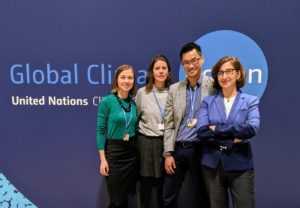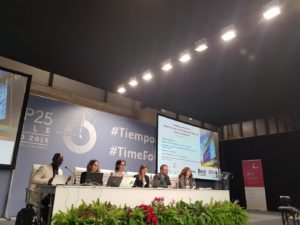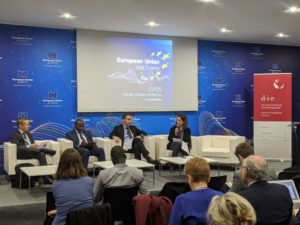
The 2019 UN Climate Change Conference (COP 25) from 2-13 December was all about raising ambitions of countries’ climate plans, rules for global emissions trading and addressing loss and damage from climate change. Together with partners from around the world, DIE co-hosted a series of events on managing climate risk and loss and damage, the prospects of EU climate cooperation, the role of non-state actors, and on climate-induced migration.
Climate risks, and loss and damage
DIE co-hosted an official UNFCCC side event on “Breaking new ground: advancing loss and damage governance and finance mechanisms” together with the Institute for Sustainable Development and International Relations (IDDRI), Bread for the World, and ACT Alliance. Heike Henn, Commissioner for Climate Policy and Climate Financing of Germany’s Federal Ministry for Economic Cooperation and Development (BMZ) discussed critical areas for enhanced action on loss and damage and the potential role of Germany in supporting these processes. Richard Klein (Stockholm Environment Institute) delivered a thought-provoking keynote on practical approaches to deal with loss and damage, and DIE Associate Researcher Idil Boran (York University) presented elements of an effective climate risk governance.

Moreover, Mariya Aleksandrova presented her research on climate risks and opportunities for the social protection sector during the Development and Climate Days organized by the Food and Agriculture Organization of the United Nations (FAO), the Red Cross Red Crescent Climate Centre (RCCC), International Institute for Environment and Development (IIED), United Nations Disaster Risk Reduction (UNDRR) and the InsuResilience Global Partnership.
Harnessing development cooperation to enhance climate ambition
Further, DIE co-organized a science-policy event, together with IDDRI and the EU Commission’s DG DEVCO, on harnessing external cooperation to raise climate ambition. More than ever, the EU is expected to exert strong leadership on climate action. This event highlighted key opportunities to enhance climate ambition through development cooperation with EU partner countries.
The first session of the event highlighted key features of EU and German external cooperation – past, present and future – in relation to climate change through presentations from DG DEVCO and BMZ, and engaged the perspective of partner countries through an input from Dr Godfrey Bahiigwa, Director of the Department of Rural Economy and Agriculture of the African Union. Further highlighting the links between climate and development policies and the need for policy coherence, the second session brought in scientific perspectives to identify key opportunities and areas that warrant greater attention, with a particular focus on land-use and agriculture in Africa.

DIE researcher Gabriela Iacobuta presented research on NDC-SDG linkages and recommendations of the European Think Tanks Group (ETTG). Zinta Zommers, lead author of the IPCC Special Report on Climate Change and Land and Jonathan Mockshell, agricultural economist from International Centre for Tropical Agriculture (CIAT), provided expertise on climate change implications for future land-use in Africa.
Gabriela Iacobuta shared her expertise on the importance of raising climate ambition through development cooperation in an interview at the UNFCCC’s Climate Action Studio.
Global climate action
In another official UNFCCC side event DIE, together with York University (Canada), and partners from Brazil and Italy, discussed the role of nature-based solutions (NBS) in Global Climate Action beyond 2020. The event featured inputs from both the secretariats of the UNFCCC and the Convention on Biological Diversity (CBD), as well as examples of NBS from urban areas and forests. The discussion was moderated by DIE Associate Researcher Idil Boran (York University). DIE researcher Sander Chan presented empirical findings on the Global Climate Action agenda in the context of the UNFCCC.
Moreover, Sander Chan presented recommendations and a research plan that emerged from a climate action workshop during a high level panel session, with inter alia, High-level Climate Champion Gonzalo Munoz, and Special Envoy of the Secretary General for the 2019 Climate Action Summit, Luis Alfonso de Alba. In an additional side event on “Lessons learned for future NDCs: making climate action more transparent and ambitious”, Sander Chan shared data-based findings from a study on links between national climate strategies and non-state and subnational climate action in NDCs.
Our video shows the tremendous potential of non-state and subnational actors to contribute to a low-carbon future, and a future that is sustainable and beneficial for all.
https://youtube.com/watch?v=VNi5YZg1gRY
Climate-induced migration

Diogo Andreola Serraglio, DIE guest researcher and Alexander von Humboldt Research Fellow, discussed legal approaches to address climate-induced migration in Latin America and the Caribbean at the side event “Strategies for climate action in Latin America: human mobility in the spotlight” organised by the South American Network for Environmental Migrations (RESAMA) and the Observatory on Climate Change, Disasters and Human Mobility in Latin America and the Caribbean (MOVE-LAM), with the support of EUROCLIMA+.
Migration and climate change are both highly complex phenomena. Our video explains terms, concepts and cases worldwide.
https://www.youtube.com/watch?v=t5SygtZCFzo
Here you will find more impressions by our colleagues from COP25.


 On 16-17 February 2017 the foreign ministers of the G20 countries gathered in Bonn, Germany’s United Nations city. This was the second ever meeting of foreign ministers under the G20 umbrella, which brings together 19 of the world’s largest economies, plus the European Union. The discussion among the G20 foreign ministers officially
On 16-17 February 2017 the foreign ministers of the G20 countries gathered in Bonn, Germany’s United Nations city. This was the second ever meeting of foreign ministers under the G20 umbrella, which brings together 19 of the world’s largest economies, plus the European Union. The discussion among the G20 foreign ministers officially